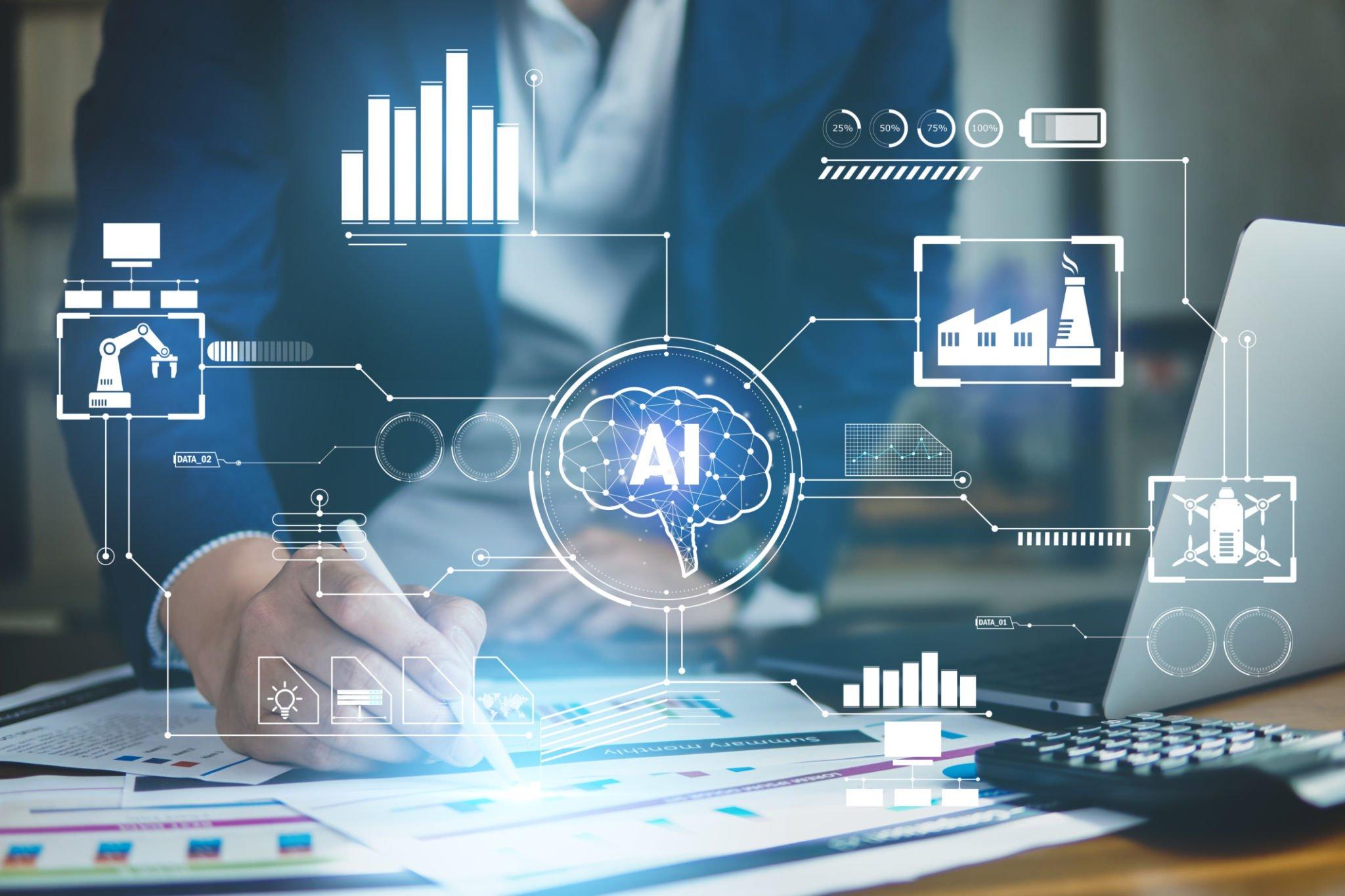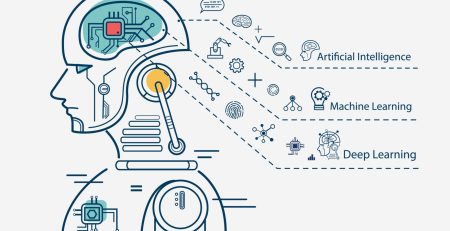AI: The Game Changer for Business Success
AI: The New Frontier in Business
As we stand on the precipice of the Fourth Industrial Revolution, it’s clear to me that artificial intelligence (AI) is not just a technological trend, but a significant shift that’s transforming the way we conduct business.
My Introduction to AI in Business
My journey into the world of AI began as a fascination with its potential to solve complex problems and streamline operations. As I delved deeper, I realized that AI is more than just a buzzword. It represents a fundamental change in how we approach and solve problems in business. If you’re new to the concept, you can explore the artificial intelligence definition to get a better understanding.
From automating routine tasks to predicting trends with astonishing accuracy, AI’s capabilities are vast and varied. But what struck me most was its potential to transform every aspect of a business, from customer service to supply chain management.
The Rising Impact of AI in Business
There’s no denying that the impact of artificial intelligence in business is growing rapidly. A survey by McKinsey Global Institute found that 47% of companies have embedded at least one AI capability in their business process, up from 20% in 2017.
| Year | Companies Using AI |
|---|---|
| 2017 | 20% |
| 2019 | 47% |
This growing adoption of AI is driven by a recognition of its immense potential to drive business success. AI can provide valuable insights from data that can shape strategic decisions. It can automate tasks, freeing up employees’ time for more value-added work. It can even revolutionize customer service, offering personalized experiences at scale.
Another area where AI is making a significant impact is in the realm of predictive analytics. By analyzing vast amounts of data, AI can identify trends and patterns that humans might miss, allowing businesses to anticipate future scenarios and make proactive decisions.
The rapid advancements in AI technologies, such as machine learning, are only accelerating this trend. As these technologies become more sophisticated and accessible, I believe that AI’s impact on business will continue to grow.
However, harnessing the power of AI is not without its challenges. It requires a clear understanding of AI’s capabilities, a strategic approach to its implementation, and a willingness to embrace change. But for those who are willing to take the leap, AI represents a new frontier in business, one filled with opportunities for innovation, growth, and competitive advantage.
The AI Advantage in Business
Artificial intelligence, or AI as it is more commonly known, is playing an increasingly significant role in driving business success. The advantages of integrating artificial intelligence in business extend far beyond mere automation. It has the potential to increase efficiency and productivity, enhance customer experience, and empower data-driven decision making.
Increasing Efficiency and Productivity
One of the key advantages of AI in a business context is its ability to boost efficiency and productivity. AI algorithms can analyze vast amounts of data at a speed and accuracy that humans cannot match. This allows businesses to automate routine tasks, freeing up employees to focus on more complex and strategic tasks.
For example, AI can be used to automate invoicing and payroll processes, which can significantly reduce administrative workload and minimize errors. AI can also streamline operations by optimizing resource allocation, predicting demand, and improving supply chain management.
According to a recent study, businesses that have adopted AI have reported an average increase in operational efficiency of 45%. This translates to significant cost savings and improved bottom line.
| Business Area | Efficiency Increase (%) |
|---|---|
| Operations | 45 |
| Administration | 40 |
| Supply Chain | 35 |
| Customer Service | 30 |
Enhancing Customer Experience
AI also plays a crucial role in enhancing customer experience. AI-powered chatbots and virtual assistants can provide 24/7 customer support, handling inquiries, resolving issues, and even upselling products and services. This not only improves customer satisfaction but also increases customer retention rates.
Moreover, AI can personalize customer experiences by analyzing customer behavior and preferences to tailor product recommendations, promotional offers, and content. This level of personalization can significantly improve customer engagement and conversion rates.
Empowering Data-driven Decision Making
Perhaps one of the most powerful applications of AI in business is its ability to empower data-driven decision making. AI algorithms can analyze vast amounts of data to uncover patterns, trends, and insights that would otherwise remain hidden. This can enable businesses to make more informed decisions, predict future trends, and gain a competitive edge.
For example, AI can analyze customer behavior data to identify which products or services are most popular, predict future sales trends, and inform marketing strategies. AI can also analyze market data to identify opportunities for expansion, diversification, or investment.
In conclusion, the integration of AI in business is not merely a trend but a strategic imperative for businesses seeking to remain competitive in today’s digital era. To learn more about AI and its applications, check out our articles on artificial intelligence definition and artificial intelligence examples.
Real World Applications of AI in Business
In the quest to leverage artificial intelligence in business, it’s useful to see how AI is already being implemented across various departments. Let’s explore the impact of AI in sales and marketing, human resources, and supply chain management.
AI in Sales and Marketing
In my experience, AI has revolutionized the way businesses approach sales and marketing. AI tools can analyze massive amounts of consumer data, identify patterns, and predict future behaviors. This leads to more targeted marketing strategies and higher conversion rates.
For example, AI can help businesses segment their audience based on purchasing behaviors, interests, and demographics. This enables companies to personalize their marketing messages, enhancing the customer experience and increasing engagement.
AI can also automate routine tasks like sending follow-up emails or answering customer inquiries, freeing up time for the sales team to focus on more strategic tasks.
AI in Human Resources
Human resources is another area where AI is making a significant impact. AI can streamline the recruitment process by scanning resumes and identifying the most suitable candidates based on job requirements. This reduces the workload for HR professionals and speeds up the hiring process.
In addition, AI can help businesses understand employee engagement and satisfaction. By analyzing data from surveys and feedback, AI can identify areas for improvement and suggest actions to enhance employee experience.
Moreover, AI-powered chatbots can answer employee queries in real-time, improving communication and saving valuable time.
AI in Supply Chain Management
Supply chain management is complex and often involves coordinating multiple moving parts. Here, AI can optimize logistics and inventory management by predicting demand, identifying inefficiencies, and suggesting improvements.
For instance, AI can forecast future sales based on historical data and market trends, helping businesses to maintain optimal inventory levels. This reduces storage costs and prevents stockouts or overstocks.
AI can also monitor the supply chain in real-time, providing alerts on delays or disruptions. This allows businesses to react quickly and mitigate risks.
In conclusion, the application of artificial intelligence in business is not confined to one department or function. From sales and marketing to human resources and supply chain management, AI is helping businesses to become more efficient, customer-centric, and data-driven. For more insights on how AI is transforming various industries, check out my articles on artificial intelligence in gaming and artificial intelligence in finance.
Overcoming Challenges to AI Adoption in Business
While the strategic value of artificial intelligence in business is clear, it’s important to acknowledge the challenges that come with its implementation. In my experience, businesses often face three main hurdles: addressing the skills gap, managing data privacy and security, and ensuring the ethical use of AI.
Addressing the Skills Gap
Artificial intelligence is a sophisticated technology that requires certain skills to be efficiently used and managed. Within the business context, there is often a skills gap, with a shortage of professionals proficient in AI-related disciplines.
One way to overcome this hurdle is to invest in training and development programs for employees. Businesses can also collaborate with educational institutions to develop curriculums and courses that equip the future workforce with the necessary AI skills.
Another strategy is to partner with AI experts and companies that can provide the required technical support. This collaboration can not only fill the skills gap but also bring fresh perspectives and innovative solutions to the business.
Managing Data Privacy and Security
Artificial intelligence relies heavily on data, making data privacy and security a crucial concern. Businesses must ensure they comply with data protection regulations and standards to maintain customer trust and avoid legal complications.
It involves implementing robust security measures to protect data at all stages – collection, storage, processing, and transfer. Regular audits should also be conducted to check for any vulnerabilities and ensure the effectiveness of the security measures in place.
Moreover, businesses should be transparent about their data practices. Customers should be informed about the kind of data being collected, how it will be used, and the measures taken to protect it.
Ensuring Ethical Use of AI
Finally, businesses must ensure the ethical use of artificial intelligence. This involves using AI in a way that respects human rights, values, and diversity. It also entails being transparent about how AI decisions are made and ensuring they are fair and unbiased.
To ensure ethical AI use, businesses can set up an AI ethics committee or work with external ethics consultants. They should also develop an AI ethics code that outlines the principles and guidelines for AI use within the business.
Moreover, businesses should involve their stakeholders – employees, customers, partners, and the community – in their AI ethics discussions. This can help to ensure that the AI solutions are respectful of everyone’s rights and values.
While adopting AI in business can be challenging, these hurdles can be overcome with strategic planning, thoughtful implementation, and constant learning and adaptation. With the right approach, businesses can leverage AI to drive growth, innovation, and competitive advantage. For more insights into AI and its applications, you can read my articles on artificial intelligence machine learning and artificial intelligence examples.
Preparing Your Business for AI
Incorporating artificial intelligence in business is not a decision to be taken lightly. It’s a strategic move that requires careful planning and preparation. Here’s how I recommend you prepare your business for the integration of AI.
Building an AI-ready Culture
Creating an AI-ready culture within your organization is the first step towards successful AI adoption. This involves fostering an environment that encourages learning, innovation, and the use of data in decision-making. Encourage your team to embrace AI as a tool that can help them perform their tasks more efficiently, rather than viewing it as a threat to their jobs.
In an AI-ready culture, employees are not only comfortable with using AI tools but are also actively involved in identifying areas where AI can add value. This requires an understanding of what AI is and how it works. Consider organizing workshops or seminars to educate your team about the basics of AI. You might find our article on artificial intelligence definition useful in this regard.
Investing in Training and Development
Investing in training and development is crucial for equipping your team with the skills needed to work with AI. This includes training in areas such as data analysis, machine learning, and AI ethics. Remember, the goal is not to turn all your employees into AI experts but to give them enough knowledge to effectively use AI tools and make data-driven decisions.
Develop a comprehensive training plan that caters to the needs of different departments within your organization. For instance, your marketing team might benefit from learning about AI applications in customer segmentation and personalized marketing, while your HR team might find AI tools for talent acquisition and employee engagement useful. Our articles on artificial intelligence in gaming and artificial intelligence machine learning offer insights into the diverse applications of AI across different fields.
Collaborating with AI Experts and Partners
While it’s important to build in-house AI capabilities, collaborating with external AI experts and partners can also be beneficial. These experts can provide valuable insights and guidance on AI strategy, implementation, and management. They can also help you navigate the complex landscape of AI regulations and ethics.
By working with AI experts, you can leverage their knowledge and experience to accelerate your AI journey while minimizing risks. However, it’s important to choose your AI partners carefully. Look for partners who not only have technical expertise but also understand your business and industry.
In conclusion, preparing your business for AI is a multi-faceted process that involves building an AI-ready culture, investing in training and development, and collaborating with AI experts and partners. By taking these steps, you can ensure that your business is ready to harness the power of AI and reap its numerous benefits. For more insights into AI and its impact on business, check out our articles on artificial intelligence examples and artificial intelligence in finance.









Leave a Reply